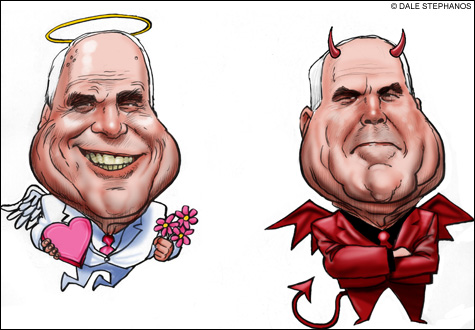McCain's crooked talk on torture

Politics ain't bean bag, as we know, and there's plenty of muck on both sides of our election process. Yet some longtime admirers of John McCain, like Washington Post op-ed columnist Richard Cohen, have offered withering indictments of how the "Straight Talk" Republican is conducing his quest for the presidency.
I am one of the journalists accused over the years of being in the tank for McCain. Guilty. Those doing the accusing usually attributed my feelings to McCain being accessible. This is the journalist-as-puppy school of thought: Give us a treat, and we will leap into a politician's lap.
Not so. What impressed me most about McCain was the effect he had on his audiences, particularly young people. When he talked about service to a cause greater than oneself, he struck a chord. He expressed his message in words, but he packaged it in the McCain story -- that man, beaten to a pulp, who chose honor over freedom. This had nothing to do with access. It had to do with integrity.
McCain has soiled all that. His opportunistic and irresponsible choice of Sarah Palin as his political heir -- the person in whose hands he would leave the country -- is a form of personal treason, a betrayal of all he once stood for. Palin, no matter what her other attributes, is shockingly unprepared to become president. McCain knows that. He means to win, which is all right; he means to win at all costs, which is not.
Meanwhile, much is made of McCain's harrowing time as a POW in Vietnam, an experience that he endured and overcame with remarkable grit and tenacity. During the RNC, the candidate himself described his captivity as a transformative experience that greatly deepened his love of country, and he has cultivated a reputation as an active opponent of waterboarding and other forms of torture.
Yet as I write in this week's Phoenix, the record is both more complicated and more mixed than McCain's image in this area would suggest:
In February, he voted against a Senate bill (now in legislative limbo) to ban the CIA from using harsh interrogation techniques on terror war detainees, theoretically leaving waterboarding and other “enhanced” tactics on the table as an instrument of US policy.
He tacitly supported the nomination as attorney general of Michael Mukasey — who, when asked by US Senator Sheldon Whitehouse during Senate confirmation hearings — flatly declined to say whether he considered waterboarding a form of torture.
In June, McCain joined President Bush in condemning a US Supreme Court decision that gave federal court access for detainees at Guantánamo Bay.
Meanwhile, debate continues about the impact of two complex pieces of legislation, the Detainee Treatment Act (passed in 2005) and the Military Commissions Act (2006), which helped burnish McCain’s reputation as a leading US opponent of torture.
Tom Malinowski, Washington director of Human Rights Watch, believes that McCain's image and his record in opposing torture still match up well -- provided the discussion doesn't consider other longtime principles of the American rule of law.
Yet critics, including Mike Ritz of Providence, a former Army interrogator who has a company, Team Delta, that simulates the experience of captivity and interrogation, believe that McCain is trying to have it both ways.
To some, the dissonance on this issue might be another example of how the self-described champion of “Straight Talk” has become more expedient in his quest for the presidency.
Ritz, who contacted the Phoenix, says he is speaking out because he is troubled by how, even after abuses at Abu Ghraib and elsewhere exacted a serious toll, damaging the global standing of the US, waterboarding and other “enhanced” interrogation techniques haven’t been ruled out as a part of American policy.
“I don’t think this is a partisan issue,” says Ritz, a self-described independent who would not identify his preferred presidential candidate, although he conceded that his criticism of McCain offers some clues. “This is an issue of how to treat human beings, how to elicit information, and how to maintain freedom.”